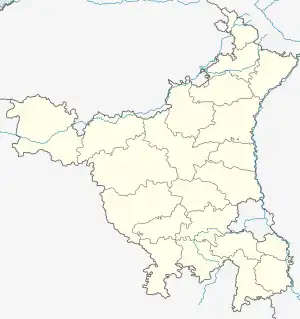Kosli | |
|---|---|
 Kosli Location in Haryana, India  Kosli Kosli (India) | |
| Coordinates: 28°23′30″N 76°28′46″E / 28.391771°N 76.4793315°E | |
| Country | |
| State | Haryana |
| District | Rewari |
| Founded by | Baba Mukteshwar Puri |
| Named for | Maharaj Koshal |
| Government | |
| • Type | Panchayat (Municipal committee) |
| Area | |
| • Total | 23.98 km2 (9.26 sq mi) |
| Elevation | 241 m (791 ft) |
| Population (census2011) | |
| • Total | 22,000 |
| • Density | 920/km2 (2,400/sq mi) |
| Languages | |
| • Official | Hindi हिंदी ,Ahirwate |
| Time zone | UTC+5:30 (IST) |
| PIN | 123302 |
| ISO 3166 code | IN-HR |
| Vehicle registration | HR – 43 |
| Sex ratio | 57:43 ♂/♀ |
Kosli is a town and "tehsil" in the Rewari district of Haryana in India. It comes in Ahirwal (a region dominated by Ahir/Yadav community). It is situated 80 kilometers South-West from Delhi. Kosli Tehsil is part of National Capital Region. Kosli is also known as the "Cultural Capital of Haryana" due to its rich cultural heritage and traditional arts.
Geographically, Kosli is surrounded by lush green fields and is a part of the fertile plains of North India. The town is located at an average elevation of 256 meters above sea level. The climate of Kosli is characterized by hot summers and cold winters, with monsoon rains occurring between July and September.
Historically, Kosli has witnessed the rule of various dynasties and empires. The town was once a part of the Kuru Kingdom and has seen the influence of the Mauryan, Jats, Sikh,Kushan, Gupta, and Mughal dynasties. During the British colonial period, Kosli was a part of the princely state of Patiala.
Kosli is predominantly an agrarian town with agriculture being the primary occupation of the people. The region is known for its production of crops such as wheat, barley, mustard, and millet. Additionally, dairy farming and animal husbandry are also practiced in the area.
The town of Kosli has a rich cultural heritage and is known for its folk music, dance, and traditional arts. The famous folk dance forms of Haryana, such as Dhamal, Khoria, and Rasleela, are performed during various festivals and celebrations. The people of Kosli take pride in preserving and promoting their cultural traditions.
In terms of education, Kosli has a number of schools and educational institutions that provide quality education to the local population. The town also has several colleges and vocational institutes offering courses in various fields.
As for transportation, Kosli is well-connected to major cities and towns in Haryana and neighboring states through a network of roads. The nearest railway station is Kosli Station, which is a major railhead in the region. The Indira Gandhi International Airport in Delhi is the closest international airport, providing air connectivity to Kosli.
Tourism in Kosli primarily revolves around its cultural heritage and natural beauty. The town has several historical sites and temples that attract tourists and pilgrims. The famous temples in Kosli include the Baba Mukteshwar Puri Matth, Hanuman Mandir, Prachin Shiv Mandir and the Goga Medi. The nearby Rewari town also offers attractions like the Rewari Heritage Steam Locomotive Museum, which houses vintage steam engines.
In terms of local governance, Kosli falls under the administration of the Rewari district. The town has a municipal committee that looks after the civic amenities and infrastructure development in the area.
History
According to Haryana State Gazetteer, Kosli was founded in 1193 A.D. by Kosal Dev Singh, the grandson of King of Delhi. Kosal Dev Singh said to have met the sage Baba Mukteshwar Puri, Kosli engaged in meditation at Koshalgarh Kosli, which was then a dense shrub jungle.
During British Raj there were as many as 70 senior Commissioned Officers and 150 Junior Commissioned Officers in Kosli. 247 soldiers from Kosli participated in the First World War between 1914-1918. Many have been decorated with medals, to quantify- 3 Indian Order of Merit, 1 Military Cross, 2 Ashoka Chakras, 1 Mahavir Chakras, 2 Shaurya Chakras, 4 COAS Commendation, 1 Police Medal. Village also includes several recipients of different military honours during British rule.[1]